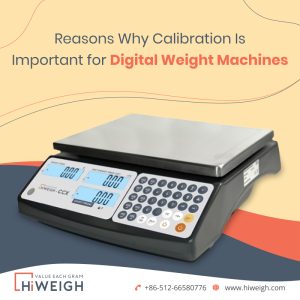


Digital weight machines have become the backbone of accurate and efficient measurement across a vast array of industries. They eliminate the guesswork inherent in traditional analog models. Their clear, digital displays provide precise readings, ensuring consistency and reducing errors. This is vital in industries like pharmaceuticals, where exact dosage is paramount, or construction, where accurate material measurement is crucial for structural integrity. The accuracy, efficiency, and additional features of a digital weight machine contribute to improved productivity, cost savings, and overall success.
Digital weight machines need regular calibration to ensure they continue to provide accurate readings. It helps optimize production processes, minimize waste, and maintain compliance. Let’s take a look at the top reasons why calibration is important for digital weight machines.
Top 10 Reasons Why Calibration Is Important for Digital Weight Machines
Here’s why calibration is important for digital weight machines:
#1 Ensures Accuracy
The main purpose of calibrating a digital weight machine is to guarantee its precision. With time, factors such as frequent use, environmental conditions, and mechanical wear can create variations in the readings of the machine. Calibration adjusts the machine to match a known standard and ensures accurate measurements are provided. These measurements are essential for various purposes, like conducting commercial transactions and advancing scientific research. They enable businesses to efficiently run businesses as well as make significant scientific discoveries.
#2 Enhances Credibility
Businesses build credibility and reputation through reliability and accuracy. Recalibrating digital weight machines on a regular basis demonstrates dedication to upholding high standards and precision. This helps boost the credibility of a business, creating trust among customers, partners, and regulatory groups. It also assures stakeholders that measurements are precise and reliable, giving them peace of mind.
#3 Ensures Uniformity
Measurement consistency is essential for repeatable and reliable results. Uncalibrated digital weight machines can provide inconsistent readings for the same thing at different periods, which can cause issues, particularly in manufacturing and quality control procedures. Frequent calibration lowers variability and improves measurement accuracy by ensuring that the weight machine produces consistent findings.
#4 Optimizes Performance
The calibration of a digital weight machine assists in maximizing its performance. It guarantees that all internal parts are working accurately and that the device is functioning at its optimum ability. This not only prolongs lifespan but also assures top performance whenever it’s utilized. Further, regular maintenance also is essential to ensure that a machine performs optimally, reducing the likelihood of breakdowns and minimizing downtime and maintenance costs.
#5 Improves Efficiency
Efficiency is essential for profitability in industrial and commercial settings. Correct weight measurements make procedures more efficient, reduce the use of unnecessary materials, and ensure product quality. Calibration contributes significantly to boosting operational effectiveness by ensuring every measurement is precise and trustworthy. This eliminates the necessity for repeated work or modifications, saving both time and resources.
#6 Ensures Compliance with Regulations
In numerous sectors, it is essential to follow regulatory standards. Regulatory authorities often mandate periodic calibration of weight machines for precision and conformity reasons. If this is not done, it may lead to non-compliance, which leads to legal penalties, fines, or possibly even shutting down operations. Regular calibration helps businesses keep up with local, national, and worldwide standards.
#7 Prevents Financial Losses
Significant financial losses can be caused by inaccurate measurements. Undercharging or overcharging in commercial transactions can result from even a small deviation in weight, affecting the bottom line. Moreover, overuse of materials or production of substandard products, both costly consequences, can also occur due to inaccuracies in manufacturing. Calibration prevents these financial losses by ensuring accurate measurements.
#8 Ensures Safety
In certain applications, like pharmaceutical dosing or chemical mixing, precision weight measurements are not just about quality, they are also critical for safety. Dangerous overdoses or incorrect chemical reactions can result from inaccurate weights. Regular calibration of digital weight machines ensures that these measurements remain accurate and safeguard both users and consumers.
#9 Supports Quality Control
Accurate measurements play a major role in quality control. Weight errors can have a direct effect on the quality of the end product in industries such as manufacturing, food and beverage, and medicine. Digital weight machines should be calibrated on a regular basis to ensure the accuracy of all measures used in quality control. This helps to maintain high standards and prevent expensive recalls or rejections.
#10 Facilitates Decision Making
Making decisions based on the correct data is very important. Be it handling inventory or conducting research, the information from weight measurements has to be accurate. By calibrating digital weight machines, you can ensure that the data used for decision-making is reliable. This helps in getting better outcomes and ensures more efficient operations.
Final Thoughts
Precision is paramount in the industrial world. A single gram off in a critical measurement can disrupt entire production lines, impact product quality, and even lead to safety hazards. That’s why calibration is essential for every digital weight machine used in factories, warehouses, and other industrial settings. It helps you achieve better quality control, reduce costs, and ensure the long-term success of your industrial operation.
